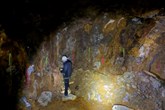ABB releases report highlighting progress towards sustainability in mining
Published by Jane Bentham,
Editorial Assistant
Global Mining Review,
ABB has released a global report, “Mining’s Moment”, that highlights the progress being made by the mining industry to make operations more sustainable.
Surveying 412 mining leaders and experts across 18 countries, the report finds that 70% of mining leaders are confident significant decarbonisation can be achieved with existing technologies. There is notable confidence amongst business leaders that they will achieve their sustainability targets because the technology to decarbonise exists: 15% are very confident they will hit their 2030 sustainability targets, while 52% are quite confident. This rises to 48% of being very confident when considering 2050 sustainability targets.
77% of mining leaders surveyed see integrated electrification, automation, and implementation of digital technologies as the key areas of technology through which sustainability goals can be achieved. Ambitious plans are in place to invest in technologies which will make operations more sustainable: 53% are anticipating significant transformation or complete overhaul; 28% are investing in moderate evolution; 19% are investing in incremental change. This means 81% are looking to evolve or transform their operations to become more sustainable.
This report is the latest installment of ABB’s Real Progress campaign, which aims to showcase the power of technology and expertise to accelerate sustainability while enhancing productivity. Mining in particular faces a challenging environment, where it must increase production to provide the raw materials for the green energy transition while limiting, and reducing where possible, its environmental impact. The report reveals an industry rising to that challenge: 73% said they were excited about the opportunities presented by the increasing recognition of mining’s role in supplying resources for green technologies.
“There is real excitement amongst business leaders about the role they are playing in supporting the green energy transition, and they are taking the issue of mining’s impact on our environment seriously,” said Max Luedtke, Global Business Line Manager for Mining, ABB Process Industries. “We see this in the successful roll-out and progress towards sustainability targets, the willingness to invest to reach these goals, and the availability of technology that can make real progress, now. However, we must not think it is job done. A significant minority are struggling to meet their goals. Our report outlines three key areas where investment can help mining businesses become more sustainable, step-by-step: investing in their people; investing in technology; and investing in their processes.”
The report finds that by investing in people, technology, and processes, mining businesses can continue to make good progress towards their sustainability goals:
- 44% surveyed said that limited expertise and skills are a significant barrier to decarbonising, while 70% of respondents said their business is committed to reskilling and training existing employees to support decarbonisation efforts.
- 70% surveyed said they believe significant decarbonisation can be achieved using existing technologies. Electrification is seen as a major contributor to being able to achieve significant decarbonisation gains; 91% of business leaders said electrification is essential to, or part of, their decarbonisation strategy.
- 46% of respondents say the risk to disruption of operations and production is a barrier to their sustainable transformation, highlighting the need for a new approach to systems and processes. This is backed up by the report respondents, with 73% believing mining transformation requires a new approach to technology and risk management.
Read the article online at: https://www.globalminingreview.com/mining/30102024/abb-releases-report-highlighting-progress-towards-sustainability-in-mining/
You might also like
American Pacific announces new geological discoveries and target vectoring in preparation for drill programme at Madison Copper-Gold Project in Montana
American Pacific Mining Corp. have announced a new geological observation from ongoing work at its Madison Copper-Gold Project in Montana.

